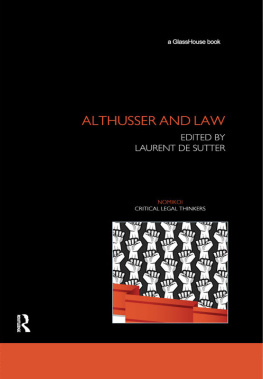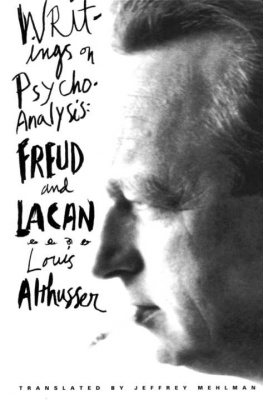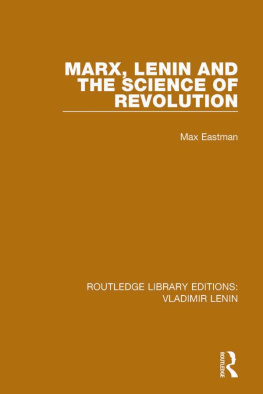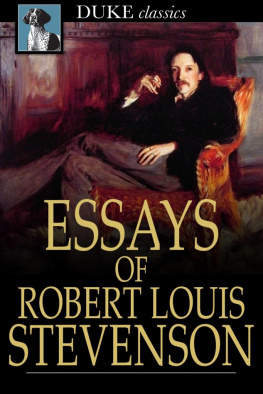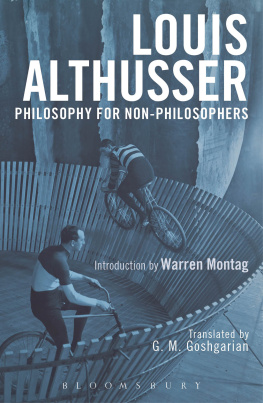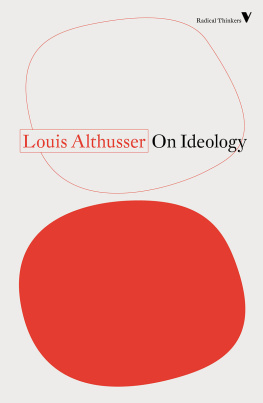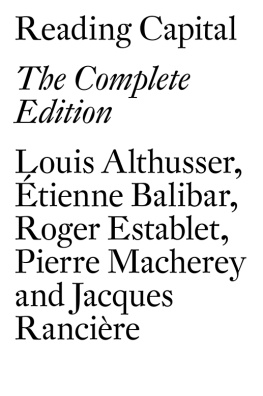Althusser Louis - Lenin and philosophy and the other essays
Here you can read online Althusser Louis - Lenin and philosophy and the other essays full text of the book (entire story) in english for free. Download pdf and epub, get meaning, cover and reviews about this ebook. City: New York, year: 2001, publisher: Monthly Review Press, genre: Politics. Description of the work, (preface) as well as reviews are available. Best literature library LitArk.com created for fans of good reading and offers a wide selection of genres:
Romance novel
Science fiction
Adventure
Detective
Science
History
Home and family
Prose
Art
Politics
Computer
Non-fiction
Religion
Business
Children
Humor
Choose a favorite category and find really read worthwhile books. Enjoy immersion in the world of imagination, feel the emotions of the characters or learn something new for yourself, make an fascinating discovery.

- Book:Lenin and philosophy and the other essays
- Author:
- Publisher:Monthly Review Press
- Genre:
- Year:2001
- City:New York
- Rating:4 / 5
- Favourites:Add to favourites
- Your mark:
- 80
- 1
- 2
- 3
- 4
- 5
Lenin and philosophy and the other essays: summary, description and annotation
We offer to read an annotation, description, summary or preface (depends on what the author of the book "Lenin and philosophy and the other essays" wrote himself). If you haven't found the necessary information about the book — write in the comments, we will try to find it.
Lenin and philosophy and the other essays — read online for free the complete book (whole text) full work
Below is the text of the book, divided by pages. System saving the place of the last page read, allows you to conveniently read the book "Lenin and philosophy and the other essays" online for free, without having to search again every time where you left off. Put a bookmark, and you can go to the page where you finished reading at any time.
Font size:
Interval:
Bookmark:
Lenin and Philosophy
and other essays
and other essays
LOUIS ALTHUSSER
Introduction by Fredric Jameson
Translated from the French by Ben Brewster

Copyright Monthly Review Press 2001
All Rights Reserved
Library of Congress Cataloging-in-Publication Data
Althusser, Louis.
[Lnine et la philosophie. English]
Lenin and philosophy, and other essays / Louis Althusser; introduction by
Frederic Jameson; translated from the French by Ben Brewster.
p.cm.
Originally published: New York: Monthly Review Press, 1971. With new introd.
Includes bibliographical references and index.
ISBN 1-58367-039-4 (pbk.)
ISBN 1-58367-038-6 (cloth) ISBN 978-1-58367-039-2
1. Lenin, Vladimir Ilich, 1870-1924. 2. Philosophy, Marxist. 3. Ideology. I. Title.
B2430.A473 L4613 2001
335.43dc21
2001052137
Monthy Review Press
146 West 29th Street, Room 6W
New York, NY 10001
Designed and typeset by Terry J. Allen, Richmond, VT
Manufactured in Canada
10 9 8 7 6 5 4
by Fredric Jameson
The Althusser we reread today is no longer the center of those heated polemics and ideological battles that characterized the Marxisms of the 1960s and 1970s. Has he now become a Marxist classic? That will partly depend on what Marxism becomes in the new century, and partly on the new post-Cold War situation of globalization and universal commodification which it confronts as a target and a field of action. His work has aroused fierce theoretical opposition, most notably in E.P. Thompsons Poverty of Theory. Crude ad hominem attacks have attempted to discredit it, as a result of the tragic events which put an end to his career (but not his writing) and which seem to have been the result of the intermittent mental illness to which he was subject. Meanwhile, his life-long membership in the French Communist Party has led many to discount his positions as mere party-line propaganda and even worse, as Stalinism. This is a point of view which systematically overlooks his principled struggles within that party and against its Stalinist orthodoxies. Finally, the rigors of his style have alienated many readers; and this is no mere matter of taste, but, as I shall show later on, a difficulty inherent in his mode of philosophizing. Nonetheless, it seems possible that today we are in a position to return to Althussers work (which has been augmented by a series of posthumous publications) in a new way, and make a new assessment of it.
The present collection includes some of Althussers most stimulating and provocative essays, which touch on the variety of themes with which his work is associated: epistemology, the materialist interpretation of Marxs development, social formation and the state, ideology, Lacanian psychoanalysis and art, on each of which he had distinctive things to say. Do these various interventions really make up a philosophical system of some kind? The essay on Lenin and Philosophy would seem to deny it. Basing himself on Marxs famous but enigmatic remark in The German Ideologymorality, religion, metaphysics, all the rest of ideology have no history, no developmentAlthusser argues against a conception of philosophy as an autonomous realm of systems that evolve in time, and rather as an intervention into theory, and in his own case, as the intervention of class struggle and partisanship into theory. It is a formulation which suggests that Althussers texts are always polemical and situation-specific; they always address a historical and political context in which he seeks to clarify the stakes, and to reveal any given conceptual debate as a struggle between idealist tendencies of all kinds and Marxian materialism. The peculiar harshness and even occasionally hectoring tone of his writing reflects this omnipresent polemic stance; he corrects our vaguer preconceptions at every turn and implacably specifies and differentiates the crucial nuances (often by way of the omnipresent italicized word, the heightened and significant intonation). This means that every idea in these pages appears only as the idea of someone, as the ideological projection of that idea from an identifiable (political) position: and that Althusser will never be able to give us what he considers to be a correct version of that idea without first discrediting its ideological competitors and revealing them to be ideological in the first place.
Is this complex of interventions and polemic positions then simply to be identified as a form of Marxism? As with Lacan in psychoanalysis, Althusser considered his work to mark a return to some purer spirit of Marxism, a spirit he associated with Leninism and which he considered to have been distorted and displaced, first by the socialism of the Second International, and then by Stalinism, as well as by the various existential and humanist Marxisms (Sartre, Kolakowski, the Yugoslavian Praxis school) influential in his own period. These deviations, fully as much as the idealisms of bourgeois philosophy which in any case unwittingly tainted them, are the principal targets of his war on all fronts to restore Marxism-Leninism to its original class-based antagonistic stance. In particular, he fought to secure a radical de-Stalinization of the Communist Party (we are in the Khrushchev era) not in any liberal (humanist) direction, but for a genuinely left and revolutionary politics. The evolution of these parties since Eurocommunism and above all since the disintegration of the Soviet Union makes this attempt even more meaningful than it was at the time.
But has not Althusserianism been termed a structural Marxism? And is not Althusser to be numbered (as he has so often been) among the great or founding figures of structuralism as such, along with Claude Lvi-Strauss, Jacques Lacan, Roland Barthes, Michel Foucault and Jacques Derrida (these last two indeed personally associated with Althusser over a considerable period)? And if so, what would that imply for the nature of the Marxism he himself represented as a more authentic and original variety?
The answer lies in the nature of Marxism itself, and I will take the liberty of rephrasing what I take to have been Althussers position in a rather different language (which he would no doubt have rigorously disputed). Marxism is not a philosophy, I would argue (so far in agreement with Althusser): it is, like psychoanalysis and unlike any other contemporary mode of thought, what I will call a unity-of-theory-and-practice. This means that it has concepts, but that those concepts are also forms of practice, so that one cannot simply debate them in a disinterested philosophical way without the uncomfortable intervention of practical positions and commitments. But it also means that the various philosophical currents of the time have always been able to seize on those concepts and to transform them into so many distinct and seemingly autonomous philosophies: thus we have had a positivistic Marxism (Engels), a Kantian Marxism (the Second International), a Hegelian Marxism (Lukcs), a pragmatist Marxism (Sidney Hook), and so on down to the various phenomenological, existentialist, religious, yes even poststructuralist or postmodern, Marxisms of the post-War period. Each of these philosophies has in my opinion something to teach us, and illuminates a new aspect of that original unity-of-theory-and-practice which is Marxism as such; but the latter is always distinct from all of them.
So there would be nothing particularly surprising about the appearance of some properly structuralist Marxism (taken as just such a philosophy) except that we must register the fact that Althusser fought unremittingly against that characterization of his own work. For one thing, his is not a language-based philosophy; it conceives of structure (a word he shows some reluctance to use), not as a set of binary oppositions, but rather as distinct levels, related to each other but each one semi-autonomous and having its own specific logic. Indeed, I would myself be willing to call Althusser a structural Marxist, but on one key condition: that it be clearly understood in advance that for him there exists only
Next pageFont size:
Interval:
Bookmark:
Similar books «Lenin and philosophy and the other essays»
Look at similar books to Lenin and philosophy and the other essays. We have selected literature similar in name and meaning in the hope of providing readers with more options to find new, interesting, not yet read works.
Discussion, reviews of the book Lenin and philosophy and the other essays and just readers' own opinions. Leave your comments, write what you think about the work, its meaning or the main characters. Specify what exactly you liked and what you didn't like, and why you think so.

